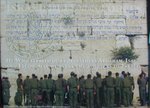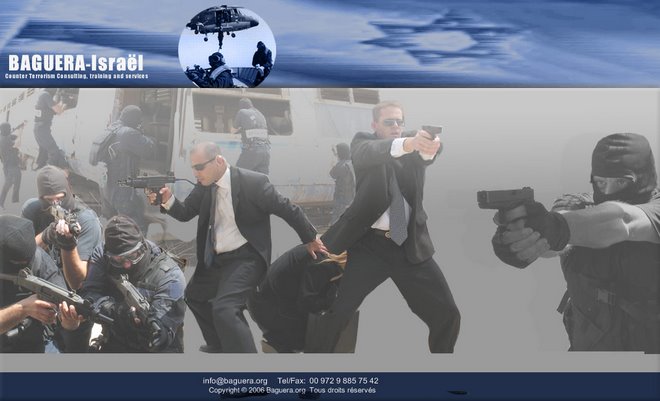Set Your Watch with B'nai Elim Jerusalem Time
Jerusalem On Line - Channel 2 News from Israel
UN Doomsday Treaty With Ginny Simone
19 February 2007
Three Explanations for al-Qaeda's Lack of a CBRN Attack
Three Explanations for al-Qaeda's Lack of a CBRN Attack
By Chris Quillen
The evidence of al-Qaeda's interest in conducting a terrorist attack with chemical, biological, radiological, or nuclear (CBRN) weapons appears compelling. As early as 1998, al-Qaeda leader Osama bin Laden declared the acquisition of CBRN weapons a "religious duty" for Muslims [1]. He followed up in 2003 by asking for and receiving a fatwa from Saudi Sheikh Nasir bin Hamid al-Fahd that condoned the use of CBRN weapons by Muslims against infidels [2]. Combined with the multitude of warnings from al-Qaeda associates that a CBRN attack against the West is not only forthcoming but also long overdue, the Muslim "duty to warn" has been firmly established. In al-Qaeda's opinion, no further justification is needed and no additional warnings are required [3].
These words have also been backed up by deeds. In the early 1990s, al-Qaeda began its efforts to acquire radiological and nuclear materials [4]. While no evidence exists that these efforts have succeeded, there is little doubt that al-Qaeda continues to pursue this capability today. Prior to the fall of the Taliban, the training camps in Afghanistan taught recipes for the manufacturing of poisons and toxins including cyanide and botulinum. A video recovered by CNN in Afghanistan in 2002 clearly demonstrates that al-Qaeda had some success in manufacturing chemical weapons in the form of a poisonous gas capable of causing death. The WMD Commission reported that al-Qaeda had similar success with biological weapons, including the acquisition of at least small quantities of the virulent strain of "Agent X" which has been widely reported to be anthrax [5]. While some technical hurdles remain for al-Qaeda to weaponize and effectively employ CBRN weapons on a mass-casualty scale, the terrorist group clearly is capable of conducting small-scale, low-tech CBRN attacks.
Given this stated desire and apparent capability to conduct a CBRN terrorist attack, why has al-Qaeda not yet launched an attack with such weapons? This analysis explores three possible explanations for this lack of a CBRN attack: disruption, deterrence and, most disturbingly, patience.
Disruption
An encouraging explanation is that al-Qaeda's efforts have thus far been disrupted through a combination of stepped-up counter-terrorist efforts after 9/11 and possibly the simple luck enjoyed by government authorities. Clearly, the al-Qaeda CBRN programs that existed in Afghanistan under the Taliban were at least temporarily disrupted by the 2001 U.S.-led invasion and subsequent need to move to safer locales. According to this explanation, al-Qaeda's CBRN programs have yet to recover from this significant setback.
Several specific CBRN attack plots have apparently been disrupted, although none advanced far beyond the initial planning stages. In May 2002, Jose Padilla arrived in the United States, reportedly planning a "dirty bomb" attack, but never got much beyond the idea stage. Similarly, Dhiren Barot (also known as Issa al-Hindi) was arrested in the United Kingdom in 2004, carrying relatively detailed plans for conducting a Radiological Dispersal Device (RDD) attack, but had not yet acquired the necessary materials [6]. Given that an RDD attack is widely considered the CBRN attack most likely within al-Qaeda's capabilities, these disruptions could be especially significant.
Al-Qaeda's chemical and biological plots have not fared much better. In 2003, UK police arrested a group of Algerians with recipes and materials for creating ricin and cyanide, although stories conflict about whether any actual poisonous material was recovered (BBC, April 13, 2005). A 2004 chemical plot against multiple targets in Jordan had apparently advanced to the point of acquiring vehicles and materials, selecting targets and assigning duties (al-Jazeera, May 2, 2004). It remains unclear whether the materials recovered were for the manufacture of conventional explosives or chemical gases [7].
At the same time as these arrests, however, al-Qaeda succeeded in launching devastating conventional attacks in Egypt, Turkey, Tunisia, Indonesia, Jordan, Spain, the United Kingdom, Pakistan, Afghanistan and Iraq. Thus, while al-Qaeda has suffered some setbacks in its CBRN efforts, these disruptions alone do not appear sufficient to have prevented al-Qaeda from conducting a CBRN attack given its other successful attacks.
Deterrence
Another possible explanation for al-Qaeda's apparent restraint is the threat of massive retaliation. Although an intriguing possibility, the complications of deterrence theory may offer more questions than answers.
Al-Qaeda's initial rationale for pursuing CBRN weapons was the desire to deter enemies such as the United States from attacking the organization [8]. In 2001, bin Laden specifically warned, "We have [chemical and nuclear] weapons as a deterrent" (Dawn, November 10, 2001). While this particular strategy clearly failed after the September 11 attacks, al-Qaeda may still be using its CBRN efforts as part of its deterrence strategy [9].
Traditional deterrence theory indicates that terrorist organizations are less susceptible to deterrence strategies because they lack the defined territory that can be held hostage to a retaliatory attack. Al-Qaeda's strategy, however, has long been to acquire just such territory. In his book Knights Under the Prophet's Banner, Ayman al-Zawahiri described this goal when he wrote, "Confronting the enemies of Islam and launching jihad against them require a Muslim authority, established on a Muslim land." Al-Qaeda is no doubt aware of the risks of acquiring territory. Previous efforts to establish al-Qaeda authority in Sudan, Afghanistan, Somalia, Pakistan and Iraq have all resulted in U.S. attacks. Nevertheless, al-Qaeda is an organization that requires territory to operate and carry out its mission and is clearly willing to accept this risk to achieve its stated goals.
Today, al-Qaeda is heavily dependent on its safe haven in the tribal areas of Pakistan. This dependency may have driven al-Qaeda to compromise its immediate desire to launch CBRN attacks against the United States for the longer-term goal of establishing their authority in a Muslim land as a stepping stone to future attacks and ultimate victory. In particular, al-Qaeda may assess that a significant CBRN attack against the West (or, for that matter, another major attack on the U.S. homeland) would invite a U.S. invasion of the tribal areas. The Pakistani government—always staking a position somewhere between Washington's and al-Qaeda's interests—may have even warned al-Qaeda's leadership that such an attack will lead to U.S. troops on Pakistani soil (with or without Islamabad's consent) and the subsequent end of al-Qaeda's safe haven. The U.S. occupations of Afghanistan and Iraq, not to mention the presence of thousands of U.S. troops across the border in Afghanistan, make the threat of an American invasion more than credible.
Of course, al-Qaeda is not the only combatant being deterred in this war. In fact, the United States and al-Qaeda appear to have settled into a pattern of violence acceptable to both sides. While al-Qaeda continues to launch terrorist attacks around the world, the terrorist organization appears to be deterred from launching another major attack on the U.S. homeland or a significant CBRN attack against U.S. interests by the threat of a U.S. invasion of Pakistan. Meanwhile, the United States occasionally launches missile strikes against al-Qaeda targets on Pakistani territory, but is reportedly deterred from sending ground troops into Pakistan due to the possibility that the Musharraf government would fall and an even more dangerous Islamic terrorist threat would rise from the ashes. Al-Qaeda may very well assess that a CBRN attack would upset this delicate balance.
Patience
A final possibility is that al-Qaeda simply is waiting for the right time to launch a CBRN attack. Bin Laden has often been described as an exceedingly patient man, willing to wait for the right moment to act. Major terrorist attacks such as 9/11 were in the works for years before the final order was given. Al-Qaeda's leaders reportedly view their struggle against the United States as a long one, likely to continue well after they have left this world. In this view, the attacks on September 11 were only one battle and the final destruction of the United States may take generations to complete.
Under this scenario, al-Qaeda is building its capabilities in anticipation of a great victory and will not rush to act just for the sake of acting. The planned attack on the New York City subway system with the "mubtakkar" improvised chemical device may be an example of such patience. Al-Zawahiri reportedly called off the attack because it was not an adequate follow-up to September 11 [10]. Al-Qaeda apparently wanted an even more devastating attack for its second wave. Given the carnage of 9/11, it is hard to imagine al-Qaeda wreaking even more havoc, but a CBRN attack—including the physical, psychological and economic impacts—could certainly fit the bill.
It is possible that al-Qaeda's success with the September 11 attacks has set the bar too high for its current CBRN capabilities. Al-Qaeda may be concerned that a CBRN attack that "only" kills dozens of people would be perceived as a relative failure and demonstrate its weakened position relative to its pre-9/11 stature. The organization may prefer to wait until its CBRN capability has matured to the point where its chances of success are greater and its capability for destruction has increased [11]. Given the fact that there is no indication that al-Qaeda has abandoned its pursuit of CBRN weapons, the possibility of a patient al-Qaeda is a disturbing possibility worth remembering.
Conclusion
Many of the traditional reasons why terrorist groups do not attempt CBRN attacks do not exist for al-Qaeda. The organization has clearly demonstrated its willingness to engage in indiscriminate killing on a massive scale without fear of losing the support of its followers. Al-Qaeda has also shown it is willing to take on the technical challenges involved and has had some successes in developing lethal materials including cyanide, anthrax and especially the mubtakkar device. Unfortunately, this combination of continuing interest, growing capability and demonstrated patience may one day pay off for al-Qaeda.
Notes
1. Interview with Jamal Isma'il, December 1998 and re-broadcast on al-Jazeera, September 2001.
2. Sheikh Nasir bin Hamid al-Fahd, "A Treatise on the Legal Status of Using Weapons of Mass Destruction Against Infidels," May 2003.
3. Michael Scheuer, Imperial Hubris: Why the West is Losing the War on Terror, p. 155-156.
4. Jamal Ahmad al-Fadl, Testimony before the U.S. District Court, Southern District of New York, United States vs. Usama bin Laden et al, February 2001.
5. Commission on the Intelligence Capabilities of the United States Regarding Weapons of Mass Destruction, Final Report, March 31, 2005, p. 269-270.
6. See, in particular, Dhiren Barot, "Final Presentation," posted by the London Metropolitan Police Service at http://www.met.police.uk/pressbureau/rhyme/index.htm.
7. Al-Sharq al-Awsat, April 26, 2004. Al-Hayat, April 16, 2004. Abu Musab al-Zarqawi admitted to planning a conventional bomb attack, but called the allegations of a chemical plot "fabrications" in an audio statement posted on the al-Ansar Forum, April 29, 2004.
8. According to Abu Walid al-Masri in his book The Story of the Afghan Arabs: From the Entry to Afghanistan to the Final Exodus with Taliban, published in al-Sharq al-Awsat, December 8, 2004. See also Robert Wesley, "Al-Qaeda's WMD Strategy Prior to the U.S. Intervention in Afghanistan," Terrorism Monitor, October 7, 2005 and Sammy Salama and Lydia Hansell, "Does Intent Equal Capability?: Al-Qaeda and Weapons of Mass Destruction," Nonproliferation Review, Volume 12, Number 3, November 2005, p. 625-626.
9. For another discussion of al-Qaeda's deterrence strategy, see Lewis A. Dunn, "Can al-Qaeda Be Deterred from Using Nuclear Weapons?" Occasional Paper 3, Center for the Study of Weapons of Mass Destruction, July 2005.
10. Ron Suskind, The One Percent Doctrine: Deep Inside America's Pursuit of its Enemies Since 9/11, p. 218-220.
11. See also Dunn, p. 15 "The fact that no single attack has yet occurred may simply indicate that preparations for a more spectacular multi-attack effort are under way."
Find this article at:
http://www.jamestown.org/terrorism/news/article.php?articleid=2370251
By Chris Quillen
The evidence of al-Qaeda's interest in conducting a terrorist attack with chemical, biological, radiological, or nuclear (CBRN) weapons appears compelling. As early as 1998, al-Qaeda leader Osama bin Laden declared the acquisition of CBRN weapons a "religious duty" for Muslims [1]. He followed up in 2003 by asking for and receiving a fatwa from Saudi Sheikh Nasir bin Hamid al-Fahd that condoned the use of CBRN weapons by Muslims against infidels [2]. Combined with the multitude of warnings from al-Qaeda associates that a CBRN attack against the West is not only forthcoming but also long overdue, the Muslim "duty to warn" has been firmly established. In al-Qaeda's opinion, no further justification is needed and no additional warnings are required [3].
These words have also been backed up by deeds. In the early 1990s, al-Qaeda began its efforts to acquire radiological and nuclear materials [4]. While no evidence exists that these efforts have succeeded, there is little doubt that al-Qaeda continues to pursue this capability today. Prior to the fall of the Taliban, the training camps in Afghanistan taught recipes for the manufacturing of poisons and toxins including cyanide and botulinum. A video recovered by CNN in Afghanistan in 2002 clearly demonstrates that al-Qaeda had some success in manufacturing chemical weapons in the form of a poisonous gas capable of causing death. The WMD Commission reported that al-Qaeda had similar success with biological weapons, including the acquisition of at least small quantities of the virulent strain of "Agent X" which has been widely reported to be anthrax [5]. While some technical hurdles remain for al-Qaeda to weaponize and effectively employ CBRN weapons on a mass-casualty scale, the terrorist group clearly is capable of conducting small-scale, low-tech CBRN attacks.
Given this stated desire and apparent capability to conduct a CBRN terrorist attack, why has al-Qaeda not yet launched an attack with such weapons? This analysis explores three possible explanations for this lack of a CBRN attack: disruption, deterrence and, most disturbingly, patience.
Disruption
An encouraging explanation is that al-Qaeda's efforts have thus far been disrupted through a combination of stepped-up counter-terrorist efforts after 9/11 and possibly the simple luck enjoyed by government authorities. Clearly, the al-Qaeda CBRN programs that existed in Afghanistan under the Taliban were at least temporarily disrupted by the 2001 U.S.-led invasion and subsequent need to move to safer locales. According to this explanation, al-Qaeda's CBRN programs have yet to recover from this significant setback.
Several specific CBRN attack plots have apparently been disrupted, although none advanced far beyond the initial planning stages. In May 2002, Jose Padilla arrived in the United States, reportedly planning a "dirty bomb" attack, but never got much beyond the idea stage. Similarly, Dhiren Barot (also known as Issa al-Hindi) was arrested in the United Kingdom in 2004, carrying relatively detailed plans for conducting a Radiological Dispersal Device (RDD) attack, but had not yet acquired the necessary materials [6]. Given that an RDD attack is widely considered the CBRN attack most likely within al-Qaeda's capabilities, these disruptions could be especially significant.
Al-Qaeda's chemical and biological plots have not fared much better. In 2003, UK police arrested a group of Algerians with recipes and materials for creating ricin and cyanide, although stories conflict about whether any actual poisonous material was recovered (BBC, April 13, 2005). A 2004 chemical plot against multiple targets in Jordan had apparently advanced to the point of acquiring vehicles and materials, selecting targets and assigning duties (al-Jazeera, May 2, 2004). It remains unclear whether the materials recovered were for the manufacture of conventional explosives or chemical gases [7].
At the same time as these arrests, however, al-Qaeda succeeded in launching devastating conventional attacks in Egypt, Turkey, Tunisia, Indonesia, Jordan, Spain, the United Kingdom, Pakistan, Afghanistan and Iraq. Thus, while al-Qaeda has suffered some setbacks in its CBRN efforts, these disruptions alone do not appear sufficient to have prevented al-Qaeda from conducting a CBRN attack given its other successful attacks.
Deterrence
Another possible explanation for al-Qaeda's apparent restraint is the threat of massive retaliation. Although an intriguing possibility, the complications of deterrence theory may offer more questions than answers.
Al-Qaeda's initial rationale for pursuing CBRN weapons was the desire to deter enemies such as the United States from attacking the organization [8]. In 2001, bin Laden specifically warned, "We have [chemical and nuclear] weapons as a deterrent" (Dawn, November 10, 2001). While this particular strategy clearly failed after the September 11 attacks, al-Qaeda may still be using its CBRN efforts as part of its deterrence strategy [9].
Traditional deterrence theory indicates that terrorist organizations are less susceptible to deterrence strategies because they lack the defined territory that can be held hostage to a retaliatory attack. Al-Qaeda's strategy, however, has long been to acquire just such territory. In his book Knights Under the Prophet's Banner, Ayman al-Zawahiri described this goal when he wrote, "Confronting the enemies of Islam and launching jihad against them require a Muslim authority, established on a Muslim land." Al-Qaeda is no doubt aware of the risks of acquiring territory. Previous efforts to establish al-Qaeda authority in Sudan, Afghanistan, Somalia, Pakistan and Iraq have all resulted in U.S. attacks. Nevertheless, al-Qaeda is an organization that requires territory to operate and carry out its mission and is clearly willing to accept this risk to achieve its stated goals.
Today, al-Qaeda is heavily dependent on its safe haven in the tribal areas of Pakistan. This dependency may have driven al-Qaeda to compromise its immediate desire to launch CBRN attacks against the United States for the longer-term goal of establishing their authority in a Muslim land as a stepping stone to future attacks and ultimate victory. In particular, al-Qaeda may assess that a significant CBRN attack against the West (or, for that matter, another major attack on the U.S. homeland) would invite a U.S. invasion of the tribal areas. The Pakistani government—always staking a position somewhere between Washington's and al-Qaeda's interests—may have even warned al-Qaeda's leadership that such an attack will lead to U.S. troops on Pakistani soil (with or without Islamabad's consent) and the subsequent end of al-Qaeda's safe haven. The U.S. occupations of Afghanistan and Iraq, not to mention the presence of thousands of U.S. troops across the border in Afghanistan, make the threat of an American invasion more than credible.
Of course, al-Qaeda is not the only combatant being deterred in this war. In fact, the United States and al-Qaeda appear to have settled into a pattern of violence acceptable to both sides. While al-Qaeda continues to launch terrorist attacks around the world, the terrorist organization appears to be deterred from launching another major attack on the U.S. homeland or a significant CBRN attack against U.S. interests by the threat of a U.S. invasion of Pakistan. Meanwhile, the United States occasionally launches missile strikes against al-Qaeda targets on Pakistani territory, but is reportedly deterred from sending ground troops into Pakistan due to the possibility that the Musharraf government would fall and an even more dangerous Islamic terrorist threat would rise from the ashes. Al-Qaeda may very well assess that a CBRN attack would upset this delicate balance.
Patience
A final possibility is that al-Qaeda simply is waiting for the right time to launch a CBRN attack. Bin Laden has often been described as an exceedingly patient man, willing to wait for the right moment to act. Major terrorist attacks such as 9/11 were in the works for years before the final order was given. Al-Qaeda's leaders reportedly view their struggle against the United States as a long one, likely to continue well after they have left this world. In this view, the attacks on September 11 were only one battle and the final destruction of the United States may take generations to complete.
Under this scenario, al-Qaeda is building its capabilities in anticipation of a great victory and will not rush to act just for the sake of acting. The planned attack on the New York City subway system with the "mubtakkar" improvised chemical device may be an example of such patience. Al-Zawahiri reportedly called off the attack because it was not an adequate follow-up to September 11 [10]. Al-Qaeda apparently wanted an even more devastating attack for its second wave. Given the carnage of 9/11, it is hard to imagine al-Qaeda wreaking even more havoc, but a CBRN attack—including the physical, psychological and economic impacts—could certainly fit the bill.
It is possible that al-Qaeda's success with the September 11 attacks has set the bar too high for its current CBRN capabilities. Al-Qaeda may be concerned that a CBRN attack that "only" kills dozens of people would be perceived as a relative failure and demonstrate its weakened position relative to its pre-9/11 stature. The organization may prefer to wait until its CBRN capability has matured to the point where its chances of success are greater and its capability for destruction has increased [11]. Given the fact that there is no indication that al-Qaeda has abandoned its pursuit of CBRN weapons, the possibility of a patient al-Qaeda is a disturbing possibility worth remembering.
Conclusion
Many of the traditional reasons why terrorist groups do not attempt CBRN attacks do not exist for al-Qaeda. The organization has clearly demonstrated its willingness to engage in indiscriminate killing on a massive scale without fear of losing the support of its followers. Al-Qaeda has also shown it is willing to take on the technical challenges involved and has had some successes in developing lethal materials including cyanide, anthrax and especially the mubtakkar device. Unfortunately, this combination of continuing interest, growing capability and demonstrated patience may one day pay off for al-Qaeda.
Notes
1. Interview with Jamal Isma'il, December 1998 and re-broadcast on al-Jazeera, September 2001.
2. Sheikh Nasir bin Hamid al-Fahd, "A Treatise on the Legal Status of Using Weapons of Mass Destruction Against Infidels," May 2003.
3. Michael Scheuer, Imperial Hubris: Why the West is Losing the War on Terror, p. 155-156.
4. Jamal Ahmad al-Fadl, Testimony before the U.S. District Court, Southern District of New York, United States vs. Usama bin Laden et al, February 2001.
5. Commission on the Intelligence Capabilities of the United States Regarding Weapons of Mass Destruction, Final Report, March 31, 2005, p. 269-270.
6. See, in particular, Dhiren Barot, "Final Presentation," posted by the London Metropolitan Police Service at http://www.met.police.uk/pressbureau/rhyme/index.htm.
7. Al-Sharq al-Awsat, April 26, 2004. Al-Hayat, April 16, 2004. Abu Musab al-Zarqawi admitted to planning a conventional bomb attack, but called the allegations of a chemical plot "fabrications" in an audio statement posted on the al-Ansar Forum, April 29, 2004.
8. According to Abu Walid al-Masri in his book The Story of the Afghan Arabs: From the Entry to Afghanistan to the Final Exodus with Taliban, published in al-Sharq al-Awsat, December 8, 2004. See also Robert Wesley, "Al-Qaeda's WMD Strategy Prior to the U.S. Intervention in Afghanistan," Terrorism Monitor, October 7, 2005 and Sammy Salama and Lydia Hansell, "Does Intent Equal Capability?: Al-Qaeda and Weapons of Mass Destruction," Nonproliferation Review, Volume 12, Number 3, November 2005, p. 625-626.
9. For another discussion of al-Qaeda's deterrence strategy, see Lewis A. Dunn, "Can al-Qaeda Be Deterred from Using Nuclear Weapons?" Occasional Paper 3, Center for the Study of Weapons of Mass Destruction, July 2005.
10. Ron Suskind, The One Percent Doctrine: Deep Inside America's Pursuit of its Enemies Since 9/11, p. 218-220.
11. See also Dunn, p. 15 "The fact that no single attack has yet occurred may simply indicate that preparations for a more spectacular multi-attack effort are under way."
Find this article at:
http://www.jamestown.org/terrorism/news/article.php?articleid=2370251
Subscribe to:
Post Comments (Atom)
Colonel Richard Kemp, British Army - Comment on the IDF's Actions in Gaza
Radical Islams Plans for Western Civilization
THE THIRD JIHAD - WATCH THIS IMPORTANT FILM NOW - FREE
Obama's true agenda...Throw Israel Under the Bus
****Regarding Obama’s Speech before the U.N. Obama has surpassed the peanut farmer Jimmy Carter as the worst and most anti-Israel, anti-Semitic, Arabist President who has ever occupied the White House. Not only is he is a narcissistic moron who is dragging America into an abyss; Obama is the most dangerous threat to World Freedom, Liberty and Western Civilization since Hitler. (Blogmaster)
Senator Joe Leiberman 'Islamist Extremist Regime'
JOHN VOIGHT ON OBAMA'S DISTAIN FOR ISRAEL
CHAZAK CHAZAK
ON THE PATH TO MUSLIM DOMINATION - REVERSABLE? STOPPABLE?
2 STATE SOLUTION - COMMENTARY BY THE "18"
A message to the Jewish people and the entire world
Chronicles I - 16:15-18: "Forever remember His covenant that he commanded forever; That He made with Abraham and swore to Isaac; and confirmed in a decree for Jacob, for Israel, as an eternal covenant; saying to You I will give the Land of Cannan as your alloted heritage"

























No comments:
Post a Comment